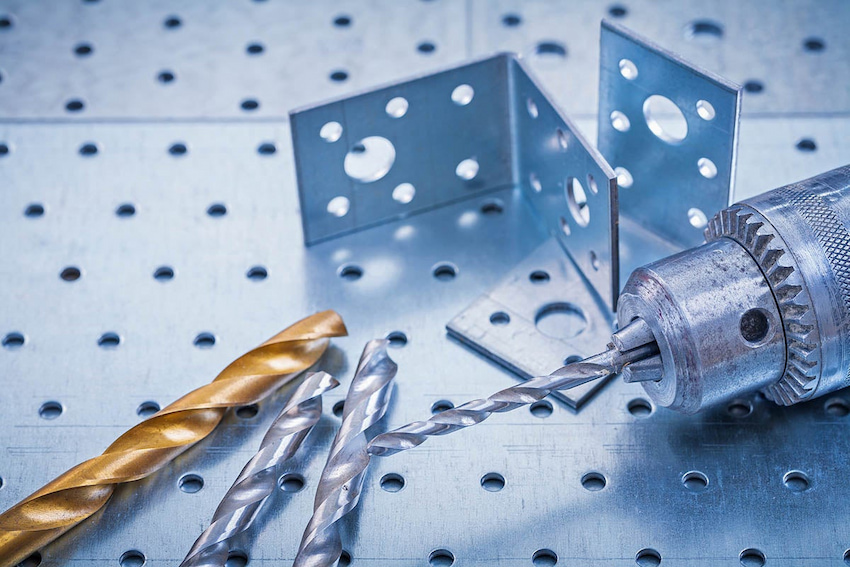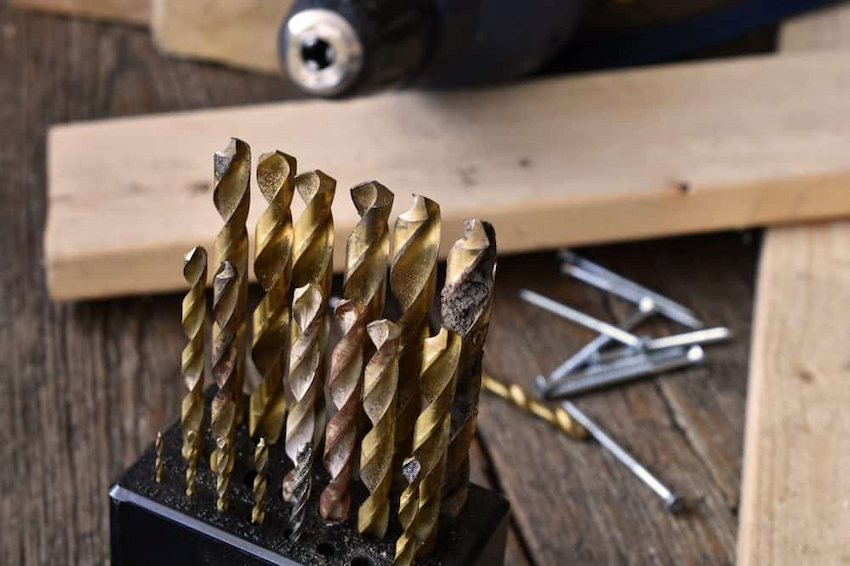Looking for drill bits but confused by all the types? There are a few factors to consider when you want to drill that perfect hole. The most important is the type of materials you are drilling into. This leads to drill bits sourced from different materials, and in varying diameters and lengths. The bits can also be coated when you need extra strength and durability when drilling into especially hard surfaces. And you also have to ensure that the drill fit fits the drill, with or without the right accessories.
Drill Bit Materials and Coatings
Possibly the biggest dilemma you’ll face when choosing the right drill bit for your application is the material it’s made of. And this either limits or extends usage, and determines how long the bits will last. Mild carbon steel is the entry point into drill bit materials and is good for soft woods and metals. They’re cheap to buy but won’t last long. Better are bits in high carbon steel that keep cutting edges sharper for longer, so are more effective.

Popular choices for a range of tasks are HSS or High-speed steel, a general-purpose material that will effectively drill into most surfaces. This includes wood, fibreglass, plastics, and softer metals like aluminium. If you try to use these in anything harder, they soon start to heat up, and drilling comes to an abrupt stop. Move on to cobalt bits when you need that extra strength for things like stainless steel and other mild or hard metals. These are essentially HSS bits with the benefit of tough cobalt coatings. The resulting bit works better at higher temperatures, so wear is reduced
On the harder side of things, titanium offers longer wear, the ability to work at higher drill speeds, and lower heat levels. Drills with titanium coatings also fare better against corrosion. They’re ideal for steel, iron, all types of wood, and harder plastics. Titanium coatings to look for are Titanium Carbon Nitride and Titanium Aluminium NItride, which are typically harder than ordinary Titanium Nitride.
Carbides are one step down from ultra-hard diamond drill bits for sale. Tungsten carbide bits are a compound consisting of tungsten and carbon. They stay sharper for considerably longer than all hereto mentioned materials. And they work in SDS and hammer drills for drilling into all types of masonry, including solid and hollow concrete, concrete block, bricks, mortar and tiles.
What are Diamond Coated Drill Bits?
For drilling into hardened ceramics, stone, glass, tiles, bone, and precious and semi-precious gems use drill bits with diamond coatings. These aren’t intended for wood; plastics or metals, where regular HSS or carbide bits perform better. Diamond drill bits for sale can be solid but often in smaller diameters and used with shaping jewellery products. The majority though are hollow core, and designed so that water can flow inside and out around the drill bit to keep it cool. This also helps in removing debris. Shank widths, lengths, and shapes have more variation than regular drill bits that despite the hardness are designed to tackle inherent brittleness that has led to the bits snapping off the chuck and chuck attachments.
Types of Diamond Drill Bits
Depending on how the diamond coating is layered and applied there are two types of diamond drill bits – electroplated and sintered. Electroplated drill bits have a single coating added to the steel shank. Nickel is used here as the bonding metal. They’re cheaper alternatives to sintered diamond coatings but don’t last as long. Once the coating has worn away, the bits are rendered useless and need to be replaced.
Sintered diamond drill bits for sale have multiple layers of diamond coatings, making them considerably less prone to wear and this is evident in the price difference. They require regular maintenance and cleaning with an aluminium oxide stone, to reveal a fresh diamond layer underneath. Sintered core drills are mainly used by stone masons, and sintered diamond burrs with engravers, glaziers, and sculptors.

Using Diamond Drills
Ensure that the diameter of the bits fits your type of drill. Smaller diamond drill bits measuring 0.75 to 3mm in diameter won’t fit into a standard rotary drill so require appropriate collets or chucks.
When drilling holes, carving, grinding, deburring, and shaping different materials, a diamond bit should be used at slower drill RPMs (between 5000 to 7000) with periodic use of water or lubricants to dissipate any build-up of heat. If you smell burning, then turn off the drill immediately. Generally, the harder the material, the slower the RPMs. Also, avoid applying too much pressure.
How Long do Diamond Bits Last?
Diamond drill bits last depending on how they’re used, and the hardness of the materials they need to drill. Slower speeds and adequate cooling. either with cautious use of water or lubricants, maintain drill bit life that much longer. Start out with slower RPMs when making initial holes. This also avoids the risk of scarring, cracking, or damaging the materials that are being drilled. If you often work with harder materials, like sapphire, expect the bit to last less than say when working with glass or tiles.


